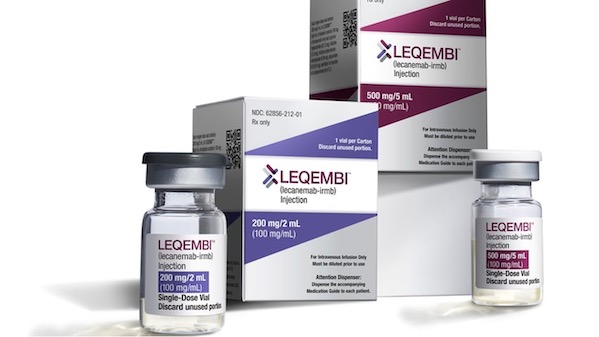With full Alzheimer’s approval in hand, Eisai and Biogen kick off Leqembi’s launch in earnest
July 8, 2023
Source: drugdu
 260
260

It’s official: Roughly half a year after the FDA granted an accelerated nod to Eisai and Biogen’s new Alzheimer’s disease med lecanemab, the companies have converted that green light into a full-fledged, traditional approval. Now, the drug—also known as Leqembi—is set to unshackle itself from a strict coverage determination by the Centers for Medicare & Medicaid services (CMS).
With a full approval in hand, Leqembi has become the first treatment shown to reduce the rate of disease progression and slow cognitive and functional decline in adults with Alzheimer’s under the traditional approval pathway, Eisai Executive Vice President Alex Scott, who oversees government affairs, said in an interview.
Those benefits stand across a “broad patient group that’s generalizable to the whole Medicare population,” he added.
Leqembi won an accelerated FDA approval in January based on its ability to reduce amyloid beta plaque, a marker of Alzheimer’s disease that's believed to be associated with improved outcomes.
For Thursday’s full nod, the partners submitted data showing the drug's benefit on an endpoint called the Clinical Dementia Rating-Sum of Boxes after 18 months of treatment. The scale rates the severity of dementia to diagnose and assess a patient's condition.
The approval comes after an FDA committee of outside experts voted unanimously that Leqembi’s pivotal trial results verify the med’s clinical benefit, with members describing the trial data as “robust,” “meaningful,” “consistent” and “significant.”
Overall, Eisai is “very pleased” with Leqembi’s label, Steven Hersch, VP of clinical research for new modalities and neurology and the international project lead for Leqembi, added in the interview.
First, the label portrays the data from Leqembi’s phase 3 Clarity AD trial, Hersch explained. Second, the indication is “pretty similar to the indication that was in the accelerated approval," the exec said.
In addition, Hersch said there are virtually “no limitations on prescribing" Leqembi to Alzheimer's patients noted in the label, whether those might have pertained to patient genotype or potential contraindications for concomitant medications such as anticoagulants and antiplatelet drugs.
Safety and the risk of side effects known as amyloid-related imaging abnormalities, or ARIA, form another important discussion topic around Leqembi, and those concerns have culminated in a box warning.
“That box warning is an important way to signal to prescribers that it’s important that they understand ARIA and important that they be able to educate and communicate with patients and caregivers about it so that they can have very informed discussions about risk and benefit,” Hersch said.
Based on the language in the label—which suggests ARIA rates and timing may vary between products—that box warning will likely apply to all future Alzheimer’s drugs in the anti-amyloid class, Scott added.
Even still, “the rates of ARIA for our product are actually quite low,” Hersch pointed out.
With that in mind, it will remain important for neurologists and other prescribers to learn more about ARIA “than they’ve needed to in the past,” Hersch explained.
To that end, Eisai has developed educational materials and programs—such as the Understanding ARIA website—to facilitate greater comprehension.
Reference: https://www.fiercepharma.com/pharma/full-approval-hand-eisai-and-biogen-kick-leqembis-alzheimers-launch-earnest
By editorRead more on
- The first subject has been dosed in the Phase I clinical trial of Yuandong Bio’s EP-0210 monoclonal antibody injection. February 10, 2026
- Clinical trial of recombinant herpes zoster ZFA01 adjuvant vaccine (CHO cells) approved February 10, 2026
- Heyu Pharmaceuticals’ FGFR4 inhibitor ipagoglottinib has received Fast Track designation from the FDA for the treatment of advanced HCC patients with FGF19 overexpression who have been treated with ICIs and mTKIs. February 10, 2026
- Sanofi’s “Rilzabrutinib” has been recognized as a Breakthrough Therapy in the United States and an Orphan Drug in Japan, and has applied for marketing approval in China. February 10, 2026
- Domestically developed blockbuster ADC approved for new indication February 10, 2026
your submission has already been received.
OK
Subscribe
Please enter a valid Email address!
Submit
The most relevant industry news & insight will be sent to you every two weeks.



